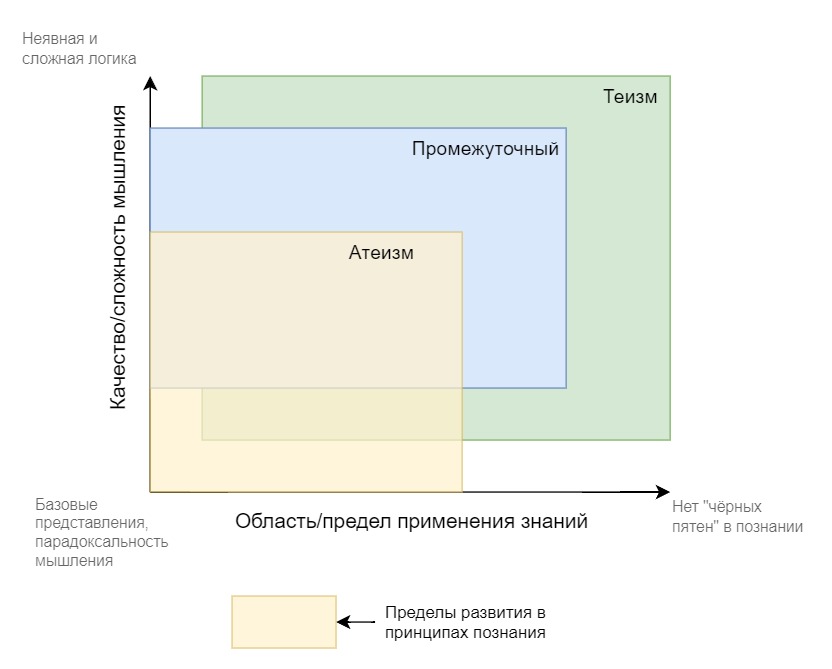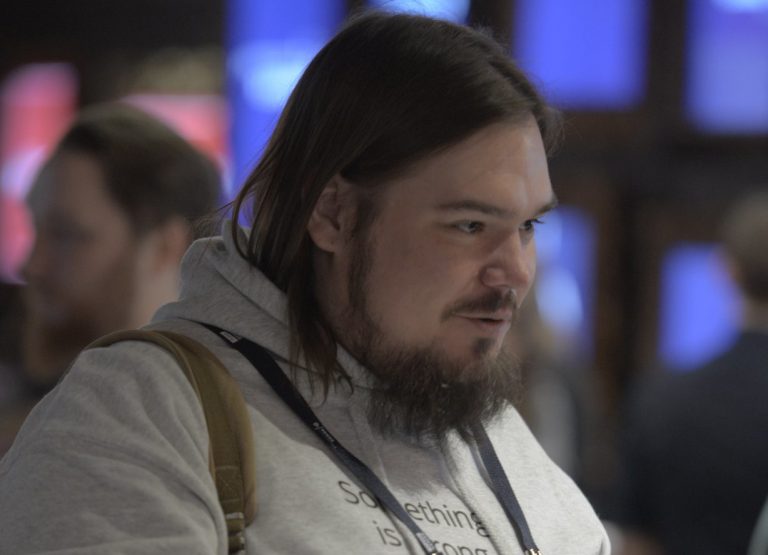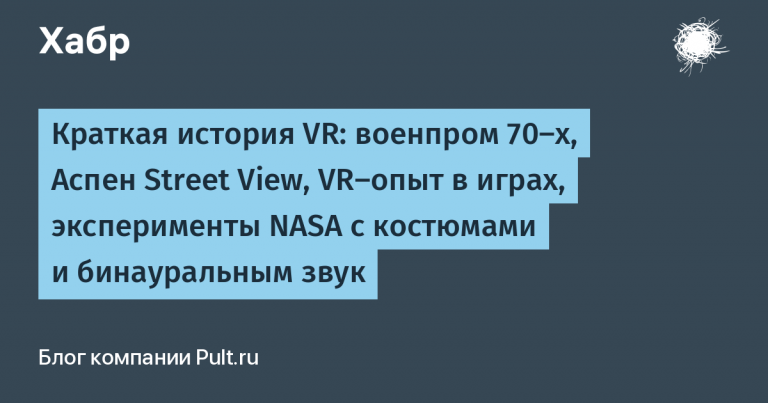Orthodoxy from a programmer's point of view
Sooner or later, every person will have to answer those questions that stand at the origins of all others. For example: about the causes of all things/the universe, the nature of moral laws, even the banal meaning of life from the same set. Is it worth talking about how much the answers to these and similar questions influence a person throughout his life?
Basically, you have the option of not doing anything about these issues. In this case, a “charming” path of nihilism awaits you with gradual becoming a renegade for any society… But you are not one of them if you are still reading the article?
If you still decide to answer these questions/find the truth, you have, by and large, three approaches:
Atheistic approach
Fabrications are based on the achievements of science (primarily exact ones). The conclusions of fabrications are variable, that is, the opinion about the phenomenon and nature changes depending on the current development of science.Intermediate approach
Fabrications are still based on the achievements of science, but conclusions from the exact sciences, the humanities, and even sciences such as philosophy are equally valuable.
Conclusions can be either variable or accepted as an eternal truth.Theistic approach
Not only various sciences are taken into account (of course, no pseudoscience), but also theology.
Contrary to popular belief, theology/theology is not, by definition, a pseudoscience, which comes directly from its definitions. At the same time, theology does not contradict classical science, their paths diverged a long time ago and the idea that a scientist cannot be a believer is shattered even upon superficial examination.

The image above covers limits human development (mental, the point is clear) depending on the chosen approach to understanding the universe. And no, there are great limits to the development of this very development do not guaranteethat’s why they are indicated by ranges.
Atheistic approach simple and logical, based on the concept “what I see, I am.” The limitations of this approach are visible to the naked eye – as much as science (exact sciences in particular) is limited, the atheistic approach is so limited. To understand, remember that at the end of the 19th century there was generally no development in the science of physics; it was believed that almost all the answers had been found and there was nowhere to develop. And then the theory of relativity appeared.
Intermediate approach expands the scope of knowledge, as well as the requirements for development, since it fully includes inexact sciences, in particular philosophy. The latter provides answers to some fundamental questions that cannot be obtained through, for example, measurements and calculations. If you want to understand the difference, try to imagine a world without communism, capitalism, psychology (at the intersection of philosophy and medicine), democracy and other achievements of a philosophical nature or nature.
Theism/Theology differs in that it provides another tool for cognition – the phenomenon metaphysics (ancient Greek: “that which comes after physics”). And no, don't confuse metaphysics with mysticism. Unlike the second, metaphysics is not paradoxical and applies to the real worldthat is, logically connected both within itself and with the material world.
Metaphysics is a tool of knowledge with which one can logically explain and justify those phenomena for which the competence of sciences is lacking.
Why is it needed (practical meaning)
Limitations of cognition, no matter how it may seem to the contrary, weigh heavily on those who bear them. I am sure that you have repeatedly experienced the deepest dissatisfaction from the inability to answer one or another, often deep-seated question. Now imagine (what can you imagine, most programmers are atheists) that you have such questions as a cart and a huge cart. Recently, one of these, having suffered completely not only from the hardships of life, wrote a whole opus about your wanderings. I, as an Orthodox person, sincerely sympathize with him and wish that God would help him take the path of salvation (and He persistently hinted), but this is not about that now.
Science will answer some of your questions, but you cannot get the truth from them (the truth is unchangeable), these are its principles. Philosophers will answer some of your questions, even quite complex questions, such as the purpose of your life and even your biological species (proletarians of all countries, unite!). But they are not able to answer some questions – about the origin of the laws of nature, about the purpose of all goals (the proletarians of all countries have united, what next?) and many others.
The answer to such fundamental questions is impossible without going beyond the classical sciences, without the creation and application of metaphysics. There is no other way, even if you hit the wall.
The only way to know metaphysics is religious.
In principle, attempts have been made to create a better person without religion and its metaphysics. Unsuccessfuleven in the USSR [новый, советский человек].
Don't like the concept of metaphysics? I'm afraid you then have no other option to answer the questions listed at the beginning of the article and similar ones. Throughout the history of mankind they have tried, but still have not succeeded. However, no, there is one thing, ancient Greek materialism. But his answers, frankly speaking, are saddening (see “The Fundamental Problem of Materialism”).
Well, it’s obvious that without clear answers to deep-seated questions, creating a better person is not worth even dreaming about. And no, transhumanism will not solve the problem – it is useless to treat the symptoms without treating the disease.
About Orthodoxy
Most often, religion uses metaphysics as a basis for the moral transformation of followers. What is characteristic is that attempts to morally transform people (for the better, for the worse, we ourselves can) are possible either through total control (unreliable and inhumane), or through religion and its metaphysics.
Orthodoxy has provided theology (the source of its metaphysics) as a method of understanding the world for just over 20 centuries. I am not a religious scholar to tell you exactly and in detail about the Holy Teaching, but I will try to convey the essence of what it is and what it offers directly to you.
It is human nature to have a predisposition, so to speak, to harmful practices. Theft, fornication, obesity and (at this moment, owners of a 300 thousand salary should strain themselves) acquisitiveness [излишнее накопление материальных благ] – and this is not all and only the top.
Agree, getting rid of this will help a lot, and not only you, but also everyone around you, so many problems will immediately disappear! And if you add good deeds to this, then it’s generally grace.
To save people and you in particular, from various practices that corrupted both the body and spirit/mind, various prophets helped people even before the appearance of the Savior Christ (the Old Testament tells about this), and after that Christianity was completely founded.
The principle of salvation from harmful practices, called sins in the Holy Scriptures, is as follows:
Be baptized
Don't sin [не совершай пагубных практик]
Do good deeds
All items are required and nothing else.
However, it is not enough to say, it needs to be carefully substantiated. The entire Bible, as well as the works of the saints, is provided as justification. The whole metaphysics of Christianity is there, applicable, justified and consistent, as it should be. It was not for nothing that entire states accepted Christianity (see Byzantium, Rus', the Holy Roman Empire and others).
And for the future – Orthodoxy is Christianity. It is called that way to separate it from the heresy (a teaching that pretends to be true, but is not such) of Catholicism and Protestantism.
Why Orthodoxy?
Existing in a society dominated by one religion, by adopting another religion you practically guarantee yourself the role of a renegade with the corresponding consequences. This is perceived by people as if you came to a barbecue, but took toffee.
Some “religions,” like Buddhism, do not have a metaphysical component, or have it in a weak form, as a result of which they do not provide answers to a considerable part of the questions of the universe.
If you are a Russian person, all other religions should, by and large, be alien to you. Orthodoxy is very strongly embedded in Russian culture, you observe the Holy Teachings even without knowing Him (mercy above justice, the principle of repentance, etc.).
And in short
Answers to many questions, such as the true (permanent and productive) laws of morality, the causes of the universe and the meaning of life and even after it (the goal of all goals) cannot be obtained in any way except by resorting to metaphysics.
The best source of metaphysics, presenting it logically consistent And applicable to the material worldis religion. She also uses metaphysics as a rationale for combating harmful practices such as senseless anger, waste, laziness and others, transforming people for the better.
Some tried to achieve the same thing in a different way, but failed.
If you are – Russian Human, Orthodoxy is the best choice, although, of course, no one is forcing you.
From my own experience: impeccable adherence to the Holy Teaching transforms people for the better, everything is serious.





